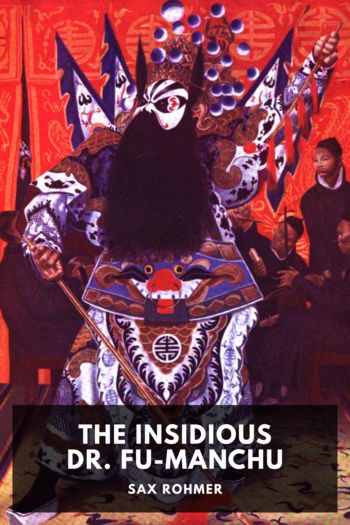The Insidious Dr. Fu-Manchu by Sax Rohmer (english novels for students .txt) 📕

- Author: Sax Rohmer
Book online «The Insidious Dr. Fu-Manchu by Sax Rohmer (english novels for students .txt) 📕». Author Sax Rohmer
“Aziz lies in the private room,” she explained eagerly, her old accent more noticeable than usual. “There is only one of the Burmese men in the house, and he—he dare not enter without orders!”
“But Fu-Manchu?”
“We have nothing to fear from him. He will be your prisoner within ten minutes from now! I have no time for words—you must believe!” She stamped her foot impatiently. “And the dacoit?” snapped Smith.
“He also.”
“I think perhaps I’d better come in, too,” said Weymouth slowly.
Karamanèh shrugged her shoulders with quick impatience, and unlocked the door in the high brick wall which divided the gloomy, evil-smelling court from the luxurious apartments of Dr. Fu-Manchu.
“Make no noise,” she warned. And Smith and myself followed her along the uncarpeted passage beyond.
Inspector Weymouth, with a final word of instruction to his second in command, brought up the rear. The door was reclosed; a few paces farther on a second was unlocked. Passing through a small room, unfurnished, a farther passage led us to a balcony. The transition was startling.
Darkness was about us now, and silence: a perfumed, slumberous darkness—a silence full of mystery. For, beyond the walls of the apartment whereon we looked down waged the unceasing battle of sounds that is the hymn of the great industrial river. About the scented confines which bounded us now floated the smoke-laden vapors of the Lower Thames.
From the metallic but infinitely human clangor of dockside life, from the unpleasant but homely odors which prevail where ships swallow in and belch out the concrete evidences of commercial prosperity, we had come into this incensed stillness, where one shaded lamp painted dim enlargements of its Chinese silk upon the nearer walls, and left the greater part of the room the darker for its contrast.
Nothing of the Thames-side activity—of the riveting and scraping—the bumping of bales—the bawling of orders—the hiss of steam—penetrated to this perfumed place. In the pool of tinted light lay the deathlike figure of a dark-haired boy, Karamanèh’s muffled form bending over him.
“At last I stand in the house of Dr. Fu-Manchu!” whispered Smith.
Despite the girl’s assurance, we knew that proximity to the sinister Chinaman must be fraught with danger. We stood, not in the lion’s den, but in the serpent’s lair.
From the time when Nayland Smith had come from Burma in pursuit of this advance-guard of a cogent Yellow Peril, the face of Dr. Fu-Manchu rarely had been absent from my dreams day or night. The millions might sleep in peace—the millions in whose cause we labored!—but we who knew the reality of the danger knew that a veritable octopus had fastened upon England—a yellow octopus whose head was that of Dr. Fu-Manchu, whose tentacles were dacoity, thuggee, modes of death, secret and swift, which in the darkness plucked men from life and left no clue behind.
“Karamanèh!” I called softly.
The muffled form beneath the lamp turned so that the soft light fell upon the lovely face of the slave girl. She who had been a pliant instrument in the hands of Fu-Manchu now was to be the means whereby society should be rid of him.
She raised her finger warningly; then beckoned me to approach.
My feet sinking in the rich pile of the carpet, I came through the gloom of the great apartment in to the patch of light, and, Karamanèh beside me, stood looking down upon the boy. It was Aziz, her brother; dead so far as Western lore had power to judge, but kept alive in that deathlike trance by the uncanny power of the Chinese doctor.
“Be quick,” she said; “be quick! Awaken him! I am afraid.”
From the case which I carried I took out a needle-syringe and a phial containing a small quantity of amber-hued liquid. It was a drug not to be found in the British Pharmacopoeia. Of its constitution I knew nothing. Although I had had the phial in my possession for some days I had not dared to devote any of its precious contents to analytical purposes. The amber drops spelled life for the boy Aziz, spelled success for the mission of Nayland Smith, spelled ruin for the fiendish Chinaman.
I raised the white coverlet. The boy, fully dressed, lay with his arms crossed upon his breast. I discerned the mark of previous injections as, charging the syringe from the phial, I made what I hoped would be the last of such experiments upon him. I would have given half of my small worldly possessions to have known the real nature of the drug which was now coursing through the veins of Aziz—which was tinting the grayed face with the olive tone of life; which, so far as my medical training bore me, was restoring the dead to life.
But such was not the purpose of my visit. I was come to remove from the house of Dr. Fu-Manchu the living chain which bound Karamanèh to him. The boy alive and free, the Doctor’s hold upon the slave girl would be broken.
My lovely companion, her hands convulsively clasped, knelt and devoured with her eyes the face of the boy who was passing through the most amazing physiological change in the history of therapeutics. The peculiar perfume which she wore—which seemed to be a part of her—which always I associated with her—was faintly perceptible. Karamanèh was breathing rapidly.
“You have nothing to fear,” I whispered; “see, he is reviving. In a few moments all will be well with him.”
The hanging lamp with its garishly colored shade swung gently above us, wafted, it seemed, by some draught which passed through the apartment. The boy’s heavy lids began to quiver, and Karamanèh nervously clutched my arm, and held me so whilst we watched for the long-lashed eyes to open. The stillness of the place was positively unnatural; it seemed inconceivable that all about us was the discordant activity of the commercial East End. Indeed, this eerie silence was becoming oppressive; it began positively





Comments (0)